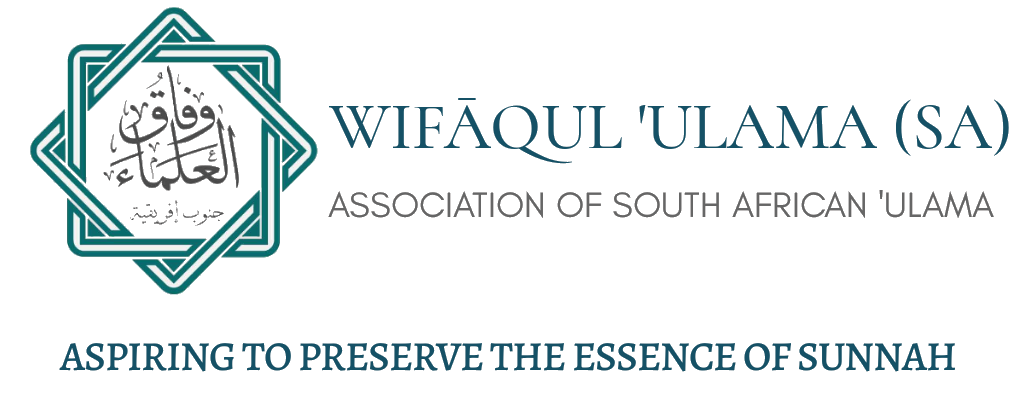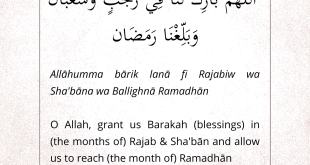 1. One should not make duaa for anything that is impermissible.
1. One should not make duaa for anything that is impermissible.
عن أبي سعيد الخدري أن النبي صلى الله عليه وسلم قال : ما من مسلم يدعو بدعوة ليس فيها إثم ولا قطيعة رحم إلا أعطاه الله بها إحدى ثلاث : إما أن يعجل له دعوته وإما أن يدخرها له في الآخرة وإما أن يصرف عنه من السوء مثلها قالوا : إذن نكثر قال : الله أكثر . رواه أحمد وأبو يعلى بنحوه والبزار والطبراني في الأوسط ورجال أحمد وأبي يعلى وأحد إسنادي البزار رجاله رجال الصحيح غير علي بن علي الرفاعي وهو ثقة (مجمع الزوائد رقم 17210)
Hadhrat Abu Sa’eed Khudri (Radhiyallahu Anhu) reports that Rasulullah (Sallallahu Alaihi Wasallam) said: “Whichever Muslim makes duaa to Allah Ta’ala and supplicates to Him, and his duaa does not contain any sin (i.e. asking for anything which is impermissible) or the severance of family ties, Allah Ta’ala will grant him one of three things. Either He will grant him what he had asked for (in this world), or He will keep the reward of the duaa for him in the Aakhirah, or He will avert a calamity from him.” The Sahaabah (Radhiyallahu Anhum) said: “In that case, we will engage in abundant duaa.”Rasulullah (Sallallahu Alaihi Wasallam) replied: “Allah Ta’ala is the more than everything (i.e. His power and treasures are more than what you ask for).”
2. One should refrain from consuming haraam or doubtful food and engaging in sins. Consuming haraam and engaging in sins causes one’s duaas not to be answered.
عن أبي هريرة، قال: قال رسول الله صلى الله عليه وسلم: أيها الناس، إن الله طيب لا يقبل إلا طيبا، وإن الله أمر المؤمنين بما أمر به المرسلين، فقال: يا أيها الرسل كلوا من الطيبات واعملوا صالحا، إني بما تعملون عليم وقال: يا أيها الذين آمنوا كلوا من طيبات ما رزقناكم . ثم ذكر الرجل يطيل السفر أشعث أغبر، يمد يديه إلى السماء، يا رب، يا رب، ومطعمه حرام، ومشربه حرام، وملبسه حرام، وغذي بالحرام، فأنى يستجاب لذلك؟ (مسلم رقم 1015)
Hadhrat Abu Hurayrah (Radhiyallahu Anhu) reports that Rasulullah (Sallallahu Alaihi Wasallam) said: “O people, indeed Allah Ta’ala is Pure and accepts only that which is pure. Allah Ta’ala has commanded the believers with the same command that He gave to the Ambiyaa (Alayhimus Salaam). (In regard to the Ambiyaa (Alayhimus Salaam)), Allah Ta’ala has said: “O Messengers, consume that which is pure and wholesome and perform righteous actions. Indeed I am all aware with what you do.” (In regard to the believers), Allah Ta’ala has mentioned: “O believers, consume from the pure and wholesome foods that We have provided for you.” Thereafter, Rasulullah (Sallallahu Alaihi Wasallam) explained the condition of a person who had undertook a long, arduous journey. His hair was dishevelled and his clothing was covered in dust. He raised his hands to the sky crying in supplication saying, “O my Lord, O my Lord (Help me in my difficulty).” Whereas his food and drink intake are haraam, his clothing is obtained from haraam sources; his body is nourished with haraam, so how can his duaas ever be answered?” (i.e. Despite being in this pitiable plight and condition, his duaas are not answered).
 Wifāq ul Ulāma (SA) ASSOCIATION OF SOUTH AFRICAN 'ULAMA
Wifāq ul Ulāma (SA) ASSOCIATION OF SOUTH AFRICAN 'ULAMA
